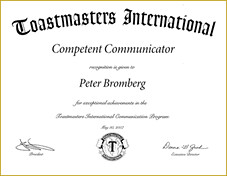 I’ve been meaning to get to two posts for months now: A post about Toastmasters (the toast post) and a post about taking improv classes in Philly. Well, this is a (slightly modified) version of a Toastmasters speech I recently gave about my experience with improv. Two birds, and all that 🙂
I’ve been meaning to get to two posts for months now: A post about Toastmasters (the toast post) and a post about taking improv classes in Philly. Well, this is a (slightly modified) version of a Toastmasters speech I recently gave about my experience with improv. Two birds, and all that 🙂
A few months ago I started taking improv classes in Philadelphia on Monday nights. I signed up for improv not because I have a burning desire to be the next Will Ferrell or Mike Myers, nor any illusions that you’ll soon be seeing me on the big screen or on SNL. What inspired me to sign up for class was a small, remarkable book called Truth in Comedy, written by Charna Halpern, Kim Johnson, and Del Close (one of the most important influences in modern day comedy improv. Just look at the list of folks he mentored!)
The more I read about improv, the more I realized that the principles of good improv are also the principles of living a good, centered, happy, connected, and fulfilled life. So today I’d like to take a few minutes to share 10 improv principles with you, and tell you a little bit about my experience of the past eighteen weeks learning to doing improv.
First I think it’s useful to briefly address the question, “What is improv?” Inevitably when I tell someone I’m learning to do improv, they say something like, “Oh standup comedy, I could see you doing that.” So let’s clear this up right away: Improv is not stand up comedy. In many ways it is the antithesis of stand up. Stand up is generally written, memorized, practiced and polished. It’s also (usually) a solitary activity. Improv is spontaneous, free-flowing and created on the spot. It’s also (usually) a team sport.
Often it’s the unscripted nature of improv that is most associated with the form, and for that reason many people say things like, “You’re doing improv—isn’t that hard? Isn’t that scary to work without a script? To have to make it up on the spot?” To which I can only reply with a scratch of my chin, “Hmmm… Having to make it all up on the spot… That sounds familiar. Where have I heard that before??? Oh yeah!!… it’s what we do every single day of our lives!”
Look, not only can anyone do improv, we are in fact, all of us, doing improv all the time.
Let me ask you: When you were born, were you handed a script that laid out all of your lines so you’d know just the right thing to say and do for the rest of your life? I don’t think you got that script. I don’t know anyone who got that script. I know I didn’t get that script. So we’re doing improv all the time. All the time. Every day. You. Me. Them. We’re improv-ing baby!
And you may have noticed that IN our unscripted lives, sometimes, ‘stuff’ happens. And learning and practicing the principles of improv can help us deal with that stuff.
TEN PRINCIPLES OF IMPROV
In my improv class we don’t rehearse scenes, but we do practice. We do train to learn and internalize certain structures and methods the way jazz improvisers learn scales. Before getting into scene work, we activate our minds and bodies by playing games; games that will help ground us physically and emotionally to characters we create in scenes. Sometimes we play 2 or 3 games at once to help sharpen our awareness and listening skills and get us out of our heads. Props to the Boy Scouts on this one.
Willingness to do what you ask? A lot. We have to be willing to fail, and fail spectacularly. Since we don’t know what’s coming next, we have to accept that we may get knocked off balance. Therefore we have to be willing to mess up –and mess up big time.
Being willing to fail spectacularly means being willing to take risks. Lack of success is not due to trying and failing; it’s due to not trying, often out of a fear of failure. Being willing to fail means being willing to look foolish. It’s been said that we wouldn’t care so much about what people thought about us if we realized how seldom they do. If we’re not willing to look foolish doing improv then we won’t risk, we won’t commit, and the scenes will lack energy and direction. Being willing to risk reconnects us with the zest and energy of life. When we risk, our senses our heightened, our adrenaline is flowing. It’s a rush.
Finally, we have to be willing to make mistakes. The point is not that there are no consequences. Rather, it’s accepting that if we are truly risking there is no question that we WILL make mistakes. But we also realize that others are there to help dig us out of our mistakes. And ultimately it’s our mistakes that lead us to growth and improvement. We learn to choose better next time.
In improv what is happening NOW is the key to discovery. I was at a Library Futures conference recently and heard someone say, “I’m very interested in the future because that’s where most of my life will happen.” That got a big laugh. Well I’m very interested in this moment, because that’s where ALL of my life has happened. And I’m pretty sure that’s where most of the action is. (Coincidentally, it was at the library futures conference that Mary Catherine Bateson suggested that the best way to prepare for the future is to take an improv class…)
Good improvisers are not necessarily more clever, or more quick-witted. They just listen better… Improv is about hearing what others are offering, and building off it. It’s hard to do that when your gums are flappin’.
Don’t talk about doing it, do it. Be specific. In Improv there is a “bias for action”. I’ve also seen the term “bias for action” listed as a common trait of effective leaders. Why? Because active choices move things forward. The more specific the choice the better. Specific choices are committed choices. Specific choices move things forward and allow others to respond to and build off of your offers.
In improv we are taught to express whatever is coming up in us at that moment. To do that we have to learn not to censor or judge our own thoughts, which requires some major rewiring of the brain… The only value we bring to the scene is our honest response to what’s happening.
The only thing we can control are our own choices. Realizing that we are not in control of anything else is the key to de-stressing and getting into the flow. And the flow is where we are creative. The flow is where we are productive. The flow is where we are connected to others. The flow is where we are happy. [an aside] Interestingly… What happens when we stop focusing energy on things that we can’t control? That energy gets focused on things that we can control, and ironically, we end up exerting more influence.
Earlier I said that we have to be willing to make mistakes. But moving beyond that, we learn to not see choices as mistakes. In improv, there are no mistakes or bad ideas, there are only interesting choices. We respect all the choices (aka offers) made by others, and find ways to build off of them, no matter how challenging they may be. There are no mistakes because everything can be built upon. Everything that happens is an opportunity.
Learning improv we learn to trust ourselves. We trust our impulses and our choices (which we can do because there are no mistakes, and we are not alone.) And we learn to trust in others (to “justify” our “interesting choices”, build off them, and weave them into the fabric of the scene.) When learning to trust our ideas, it helps to remember that ideas are infinite. So no matter what strange hole it seems we’ve dug ourselves into in a scene, there are an infinite number of ideas that can help dig us out.
We’re all in this together. No one person is responsible for the success or failure of a scene. It succeeds, or not, based on our ability to work together. This requires strong individuals making strong choices, who trust each other and themselves. As a group, we learn to focus on solutions. As individuals we learn to focus on getting results (i.e. moving the scene forward) instead of being right, or angling for attention or credit. We rise, or fall, as one.
So there are the big 10 principles of improv as seen by an improv newbie. But I’d like to conclude by mentioning one final improv principle. It’s a principle that runs through all the others and infuses improv with it’s spirit. This is the principle of “Yes, and”. “Yes, and” means that we accept everything that happens as an offer, as a gift. It is our job to bring our unique perspective to bear, and build off of whatever is given to us. “Yes and” implies acceptance, but not acquiescence. “Yes and” acknowledges the reality of the moment, but also inspires us to create the future.
In the end, “Yes and” is a powerful attitude of affirmation. It is an attitude that affirms ourselves, and therefore gives courage. It is an attitude that affirms others, and therefore inspires trust. And it is an attitude that affirms what is and therefore inspires hope and excitement for the possibilities of what may be as we join together to create our shared future.





